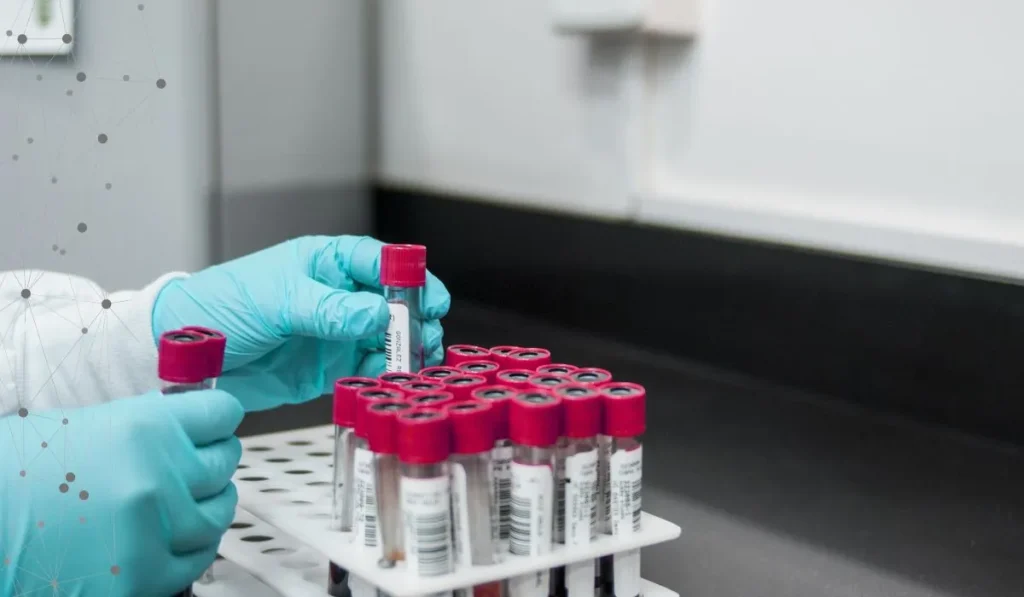Does Nicotine Show Up in a Blood Test?
If you’re wondering “does nicotine show up in a blood test?” — the short answer is yes. When you use nicotine products like cigarettes, vapes, nicotine gum, or a nicotine patch, the nicotine enters your body. Then, your body processes it and it can show up in tests — including a blood test.

What Is Nicotine?
Nicotine is a drug that comes from the tobacco plant. It’s found in things like:
- Cigarettes
- Vapes
- Nicotine gum
- Nicotine patches
- Inhalers
It can make you feel more awake and less hungry. But it can also be addictive and harmful to your heart, lungs, and other parts of your system.
How Does Nicotine Get into Your Blood?
When you smoke, chew gum, or use a patch, nicotine goes into your mouth, lungs, or skin. Then it moves into your blood. That’s how it spreads to other parts of your body — like your brain, liver, and heart.
What Is a Nicotine Blood Test?
A nicotine blood test checks your blood for nicotine or cotinine. Labs and doctors use this to see if someone has been using tobacco or nicotine products.
This test can be part of a:
- Health checkup
- Life insurance exam
- Organ transplantation screening
- Drug test

Why Would You Get a Nicotine Blood Test?
There are many reasons someone might get this test. Some of the most common ones are:
For Health Care
Doctors may use this test to check for health problems linked to smoking. This includes lung cancer, chronic obstructive pulmonary disease (COPD), breast cancer, ulcerative colitis, and psoriasis. They might also check if nicotine is raising your blood pressure or heart rate.
For Life Insurance
Many insurance companies ask for a blood test when you apply for life insurance. If nicotine is found, it can raise your policy cost because smoking is a health risk.
For Organ Transplants
People waiting for an organ transplantation may be tested for nicotine. Smoking can affect how well you heal and if the transplant works.
For a Drug Test
Even though nicotine is not illegal, some jobs may include it in a drug test, especially in health care or schools.
How Long Does Nicotine Stay in Your Blood?
Nicotine doesn’t stay in your system very long. It breaks down fast — usually within a few hours. But cotinine, the biomarker, can stay in your blood for up to 3 weeks.
How long it stays depends on:
- Your dose (how much you used)
- Your length of use
- Your diet, like a healthy diet with lots of antioxidants
- How much exercise you get
- If you have liver problems
- Your stress, fatigue, or even menopause
What Else Can Show Nicotine Use?
Besides a blood test, nicotine and cotinine can show up in:
- Saliva testing (mouth swab)
- Urine tests
- Hair follicle tests
- Breast milk (in nursing mothers)
Some tests can find nicotine for longer. For example, a hair follicle test might show use for up to 3 months!
What Can Affect Your Test Results?
Your test results can be affected by a few things:
- Using nicotine gum, a nicotine patch, or inhaler
- Secondhand smoke
- Eating certain foods (good nutrition can help)
- Some medicines like bupropion or varenicline used to quit smoking
Even alcohol or cough medicine might change how fast nicotine leaves your system.
Can You Pass a Nicotine Test?
Yes — but only if you quit using nicotine. This is called abstinence. To pass a normal blood test, you usually need to stop using nicotine for at least 7–10 days. But this depends on your health, habits, and how fast your body gets rid of it (called excretion).
Here are a few tips:
- Drink lots of liquids like water
- Eat a healthy diet full of fruits and veggies
- Get regular exercise
- Avoid alcohol and stress
- Sleep well to help with insomnia or fatigue
How Is Nicotine Linked to Health Problems?
Nicotine is more than just a poison. It can harm many parts of your body, including:
- Lung problems like asthma, COPD, and lung cancer
- Heart and blood pressure issues
- Problems in your liver, kidneys, and brain
- Increased risk for cancer, diabetes, and menopause issues
- Mental health problems like anxiety, bipolar disorder, and migraine
- Autoimmune problems like multiple sclerosis, ulcerative colitis, and psoriasis
What If You’re Trying to Quit?
If you want to stop using nicotine, talk to a doctor or dietitian. They can help with a plan to quit. You might use:
- Nicotine replacement (gum, patch, or inhaler)
- Bupropion or varenicline (stop-smoking pills)
- Therapy to manage stress, anxiety, or relapse
- Support groups or medically reviewed programs
Stopping a nicotine habit can help your pressure, breathing, and make your system feel better.

FAQs
What does a nicotine blood test look for?
It looks for nicotine or a biomarker called cotinine in your blood. Cotinine stays in the system longer and helps doctors know if you’ve used nicotine recently.
Can I fail a drug test because of nicotine?
Maybe. Some drug tests include nicotine, especially in jobs related to health care or insurance. It depends on the company and the type of exam.
How can I remove nicotine from my system faster?
Drink water, eat a healthy diet, get exercise, sleep well, and avoid alcohol or stress. These things help with excretion of nicotine.
Will nicotine from a patch or gum show up?
Yes. Nicotine from a patch, gum, or inhaler will still show up in a blood test, since it’s the same drug entering your system.
Can secondhand smoke make me test positive?
Yes, but it’s rare. Being around smoke can add some nicotine to your system, but usually not enough to make your test results show positive — unless you’re around it a lot.
Final Thoughts
So, does nicotine show up in a blood test? Yes — and labs usually look for cotinine, the biomarker of nicotine. These tests are used for insurance, drug tests, and even organ transplantation. Nicotine can affect your health, life insurance, and more.
If you’re trying to quit, that’s a great step toward better health. Talk to your doctor or a professional for support. Remember, stopping nicotine not only helps you pass tests — it helps your heart, lungs, and whole body feel better.
Always consult with your doctor. This information is medically reviewed and shared for educational purposes.








